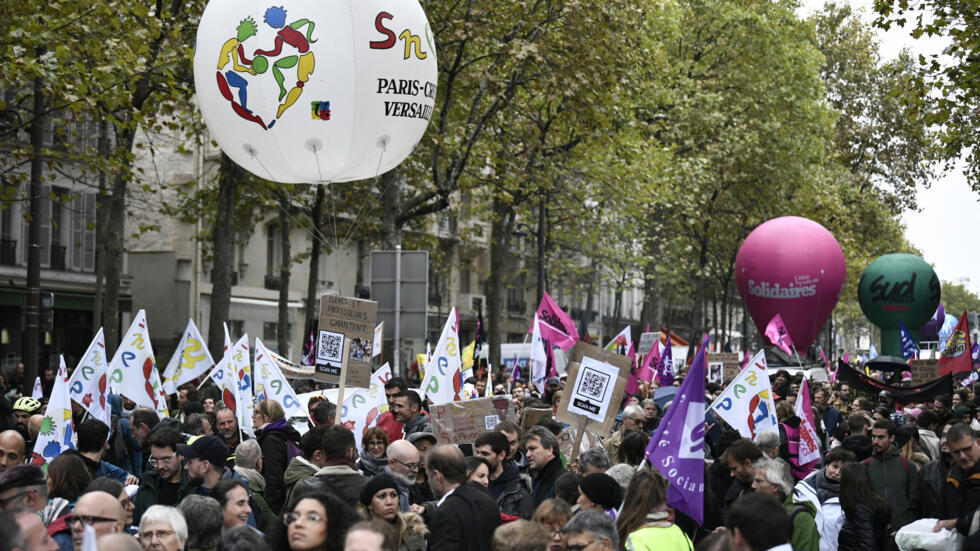Thousands strike in call for increased wages, earlier retirement
The nationwide strike called by trade union groups has seen 10,000 protestors in the western region of Brittany. There were 3,000 in the southern city of Montpellier, somewhat fewer in Perpignan. The stoppages are reported to have caused some disruption but were not widely supported.
Issued on:

Thursday's strike was followed by about one in ten teachers, according to the education ministry, leading to school closures in some areas.
One in three railway workers also stopped work, according to the CGT union, leading to cancellations on key routes including Paris-Bordeaux.
The biggest of around 200 protests nationwide drew up to 40,000 people in Paris, according to organisers. The police have not yet issued official figures.
"It's a bit disappointing," said Nathalie Bourget, a teacher at the Paris march. "We were hoping for more."
A warning shot for the government
Speaking at the march in Paris, Philippe Martinez, the leader of the CGT union, said that between protestors and strikers, "there were a lot of people involved.
"This is just a warning shot to the government and the bosses that they had better start organising wage negotiations quickly.
"And they need to watch the news, wake up to the fact that the French do not want to work longer for their pensions."
There were and estimated 3,500 marchers in the western city of Rennes, according to local media.
Several unions, including the country's biggest, did not take part, although all of them, along with left-wing political parties, are gearing up for a months-long fight over efforts to raise the pension age.
"It's the start of a social battle," left-wing MP Alexis Corbière from the France Unbowed party said as he took part in a protest march in Paris. "My hope is that this is just the beginning."
The French government has vowed to push through pension reform by the end of the winter.
Mélenchon's Marseille mobilised
Several thousand people marched Thursday morning in the southern port city of Marseille, which hard-left France Unbowed leader Jean-Luc Mélenchon represents in the National Assembly.
Dockworkers mixed with people wearing yellow vests, holding signs about retirement and against the high cost of living.
At least 200 gatherings were officially planned on Thursday throughout the country, following a call by the CGT union for a general strike.
Though the education sector has been the most affected, as teachers are particularly dissatisfied with salary increases presented in the 2023 proposed budget.
At midday the Education Ministry published figures showing 11 percent of teachers participating in the strike.
The SNUipp-FSU teacher’s union said it was expecting 20 percent of primary school teachers to be on strike, with up to 10 percent of Parisian primary schools closed entirely.
The SNES secondary school union expects 30 percent of middle and high-school teachers to be on strike.
Energy workers join the walkout
The strike has also disrupted the energy sector as nuclear power industry workers joined the walkout.
The strike called by the FNME electricity union reduced nuclear power generation by 3.3 gigawatts by early Thursday morning and hydropower output by 610 megawatts, which represents 8.5 percent of total energy production.
The strike is being taken as a test of the unions' ability to mobilise support and a barometer of potential social unrest as President Emmanuel Macron pushes ahead with plans to reform the country's pension system, with his government promising to draft legislation by the end of the year.
(With newswires)
Daily newsletterReceive essential international news every morning
Subscribe